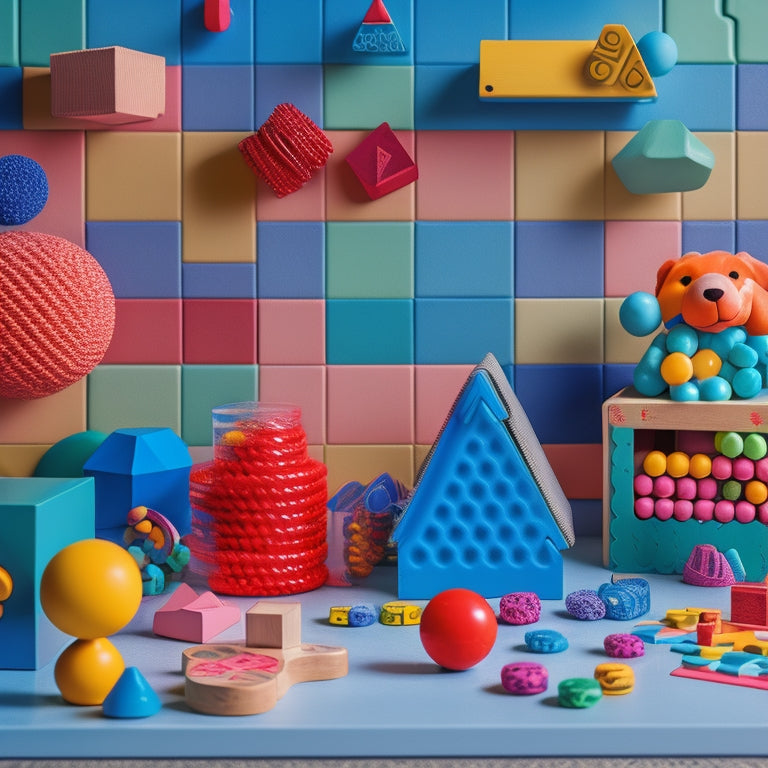
Exciting Math Toys to Boost Kids' Skills
Share
We've discovered that hands-on, interactive math toys can make all the difference in our kids' math learning journey. Visual aids and tools like abacuses and number lines help them grasp complex concepts. Innovative products bring math to life, making it fun and immersive. Math games and puzzles offer a fresh approach to learning, enhancing skills and encouraging strategic thinking. By choosing the right toys that match our kids' learning styles and abilities, we can create a fun and interactive environment that fosters growth and development. Now, let's explore more ways to supercharge our kids' math skills!
Key Takeaways
• Hands-on, interactive math toys and visual aids help young minds grasp complex math concepts and build a strong foundation.
• Innovative products, such as abacuses and number lines, bring math to life, making learning fun and immersive for kids.
• Math-based puzzles, problem-solving exercises, and games like Proof! Math Game and Big Brain Academy enhance critical thinking and logical reasoning.
• Carefully selecting math toys that match kids' learning styles and abilities ensures alignment with their developmental stage and fosters growth.
• Incorporating interactive tools into daily routines helps kids develop a strong math foundation, builds confidence, and promotes proficiency.
Math Toys for Early Learners
When it comes to introducing math concepts to early learners, we find that hands-on, interactive math toys make a world of difference in fostering a strong foundation for future math skills. We believe that hands-on activities and visual aids are essential in helping young minds grasp complex concepts.
Number sequencing and counting skills, for instance, can be effectively developed through interactive toys like abacuses and number lines. These tools enable children to visualize and manipulate numbers, making math more engaging and accessible.
Interactive Math Learning Tools
As we explore the world of interactive math learning tools, we're excited to investigate the innovative products that bring math concepts to life, making learning a fun and immersive experience for kids.
We're not just talking about math app alternatives, but hands-on math activities that engage kids in a tangible way. Digital math resources have come a long way, and interactive math games are now more accessible than ever.
From math-based puzzles to problem-solving exercises, these tools offer a fresh approach to learning math. By incorporating these interactive tools into their daily routine, kids can develop a deeper understanding of math concepts and build a strong foundation for future success.
With the right tools, math can be a fun and rewarding experience for kids of all ages.
Enhancing Math Skills With Games
We're excited to explore how math games can enhance our kids' skills, building upon the interactive tools we've discussed, and discovering new ways to make math a fun and competitive experience. Math board games, like Proof! Math Game, are perfect for developing critical thinking and logical reasoning skills. These games encourage kids to think strategically and make connections between numbers. Problem-solving puzzles, such as those found in Big Brain Academy, also play a significant role in enhancing math skills. By incorporating these games into our kids' learning routine, we can create a engaging and challenging environment that fosters growth and development.
| Game Type | Math Skills Developed |
|---|---|
| Math Board Games | Critical Thinking, Logical Reasoning |
| Problem-Solving Puzzles | Logical Reasoning, Pattern Recognition |
| Math Manipulation Aids | Visual Learning, Spatial Awareness |
Choosing and Using Math Toys
With a vast array of math toys available, we need to carefully select the ones that best fit our kids' learning styles and math abilities.
When choosing math toys, we prioritize age appropriateness, ensuring the toy aligns with our child's developmental stage.
We also opt for toys that offer hands-on engagement, as this type of learning is most effective for math skills.
By selecting toys that cater to our child's individual needs, we can create a fun and interactive learning environment.
This approach enables our kids to develop a strong foundation in math, building confidence and proficiency as they grow.
Frequently Asked Questions
How Can I Make Math Learning Fun for My Kids at Home?
As we transform our homes into vibrant math playgrounds, we're conjuring up memories of Mary Poppins, where learning is a "spoonful of sugar" delight. We make math fun by incorporating math games and kitchen math, turning mealtime into a tasty arithmetic adventure, making learning a joyful habit.
Are Math Toys Suitable for Children With Learning Disabilities?
We believe math toys can be suitable for children with learning disabilities if they incorporate inclusive designs and adaptive tools, allowing kids to learn at their own pace and build confidence in their math abilities.
Can Math Toys Be Used for Homeschooling and Online Learning?
We believe math toys can be a valuable asset in homeschooling and online learning, enhancing virtual classrooms with interactive tools that make complex concepts engaging and fun, allowing kids to thrive in a personalized learning environment.
How Do I Store and Organize Math Toys for Easy Access?
We prioritize our kids' math skills by implementing a labeling system and rotating shelves to store and organize our math toys, ensuring easy access and encouraging seamless learning experiences.
Are Math Toys Worth the Investment for Long-Term Benefits?
We believe math toys are worth the investment, as they provide a high educational ROI, yielding long-term benefits in kids' problem-solving skills and confidence, making the cost analysis a worthwhile expenditure for their future success.